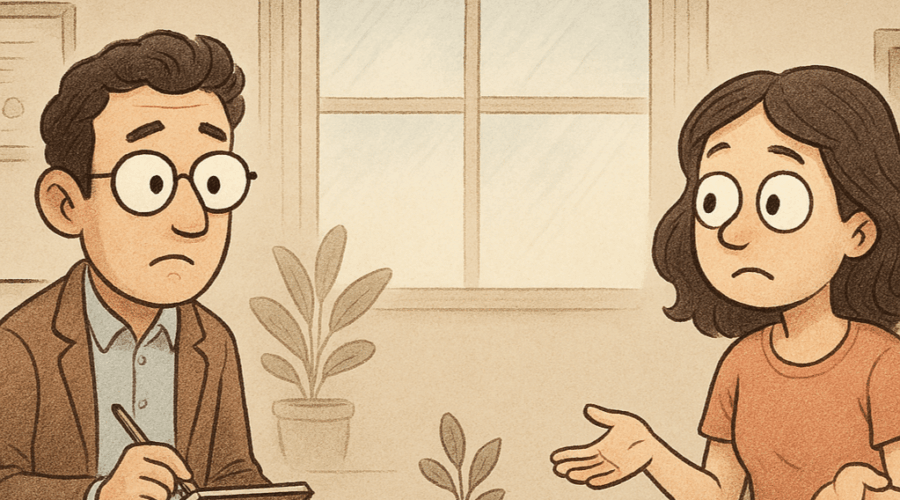It takes courage to make a marriage work. The courage to admit you’re wrong. The courage to say you’re right. The courage to take chances in communication, generosity and vulnerability. And most of all, the courage to objectively look at what’s happening emotionally inside of us. This post explores projection and projective identification, two psychological processes that can make or break a relationship.
Ever felt like something was “just not right” even when nothing is wrong? Psychologists call these Not Just Right Experiences (NJREs)—a subtle but powerful force behind OCD and OCPD. Learn what they are, why they matter, and how to manage them before they hijack your peace of mind.
We’ve got perfectionism all wrong. The real problem isn’t high standards—it’s the illusion of perfectibility and harsh judgment that have been grafted onto it. Perfectionism began as a guide toward purpose, but centuries of distortion turned it into an enforcer of impossible ideals. Instead of banishing perfectionism, we can reclaim its adaptive side—commitment, persistence, and pursuit of excellence—while stripping away conceit and control. By befriending adaptive perfectionism, acknowledging its shadow, and clarifying our purpose, we transform it from a tyrant into a trusted partner. This episode brings together science and Jungian psychology for an unconventional approach to dealing with perfectionism.
7 Vexing Questions & Encouraging Answers for Therapists Who Treat Obsessive-Compulsive Personality
Explore practical insights and nuanced strategies for working with clients who have obsessive-compulsive personality traits. Drawing on 33 years of experience, this post addresses common challenges, misconceptions, and ways to foster meaningful change—while offering a behind-the-scenes look for those in therapy.
4 Ways Perfectionists and Obsessive-Compulsives Try To Avoid Humiliation
This essay explores how perfectionist and obsessive-compulsive personalities construct “fortresses” to avoid humiliation, embarrassment, and shame. Through vivid stories and cultural examples—from Steve Jobs to Michael Jackson—it identifies four compulsive types (Boss, Workaholic, People-Pleaser, and Obsessor) and shows how their strategies both protect and imprison them.
A related and more specific unhealthy motivation that can seize people who are obsessive-compulsive and perfectionist is trying to avoid humiliation, embarrassment and shame. It’s a very limiting life strategy.
How a Goddess Became a Modern Disease: Ananke, OCPD, & the Need for Control
The very common but unrecognized disease of obsessive-compulsive personality disorder (OCPD) has a long and inglorious history—though they didn’t call it that 3000 years ago. They would have called it hubris, because the people who had this disease believed they knew everything and had the gall to try to control everything.
But they also had Anake to help them with this problem. When people recognized the goddess of compulsion and fate, they chilled out and let go of their fantasies of control. But while we might be familiar with Zeus, Apollo, and Dionysus, today we are oblivious to Ananke, and the limits she imposes. But these limits don’t go away.
And in our efforts to avoid them we become diseased.
From Alienation to Connection: Healing the Spiritual Side Effects of Compulsive Perfectionism
Perfectionism distances us rather than connecting us. There’s always something wrong with the world, so we give it the cold shoulder and go our merry way. But this actually causes alienation, that vague but ever-present sense that we are at odds with the world around us and that it’s a dangerous place. We don’t belong and it makes us anxious. As if an imperfect world could never be our world.
How to Pivot to a Life Worth Living Through Flexibility: A Review of ACT
To make a dent in the pile of material you might feel you have to read to be up on the most recent developments in mental health, here’s a practical review of the relatively new approach to therapy called Acceptance and Commitment Therapy, with brief examples of how to apply it. Because one of the main goals of ACT is flexibility, it can be very helpful to anyone struggling with obsessive-compulsive personality disorder (OCPD), or to those just challenged by some obsessive-compulsive traits, perfectionism, workaholism, or Type A personality.
Seriousness is an occupational hazard for obsessive-compulsives, Type A’s and perfectionists. Being serious can hurt relationships, mental health and physical health. Yet many of us feel duty-bound to be serious and we lose out on the benefits of humor and laughter–which can melt the rigidity which comes with being serious.
How do we know if we are micromanaging? If you constantly look over someone’s shoulder, give them detailed instructions, distrust them, and make mountains out of molehills, it will discourage creativity, diminish morale, and disrupt relationships. It may even lead to them ignoring you. It brings about the opposite of your desired effect. Productivity, responsibility and ingenuity all decrease. It’s like trying to break a horse to train it. Instead we need to macromanage, to consider the larger picture of our values and priorities.
Subscribe to Blog via Email
The Healthy Compulsive Podcast
Categories
Recent Posts
- Marriage Is Not for Sissies: Courage, Projection, and Projective Identification January 17, 2026
- Quieting the False Alarms of “Not Just Right Experiences” January 6, 2026
- Befriending Adaptive Perfectionism: From Villain to Ally December 27, 2025
- 7 Vexing Questions & Encouraging Answers for Therapists Who Treat Obsessive-Compulsive Personality December 9, 2025
- 4 Ways Perfectionists and Obsessive-Compulsives Try To Avoid Humiliation November 25, 2025
Archives
Available at Amazon and Barnes and Noble













